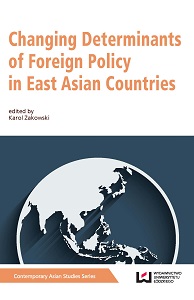DPJ Government and Climate Change Policy
DPJ Government and Climate Change Policy
Author(s): Marcin Socha
Subject(s): Governance, Public Administration, Public Law, Economic policy, Environmental and Energy policy, International relations/trade, Developing nations, Geopolitics
Published by: Wydawnictwo Uniwersytetu Łódzkiego
Keywords: climate negotiations; Japan’s environmental politics; Post–Kyoto Protocol negotiations; Democratic Party of Japan; Japan’s foreign policy; DPJ decision making process
Summary/Abstract: In 2009 election manifesto Democratic Party of Japan (DPJ) leaders voiced their decisive support for stronger engagement in international climate negotiations. The promises were realized by an ambitious climate mitigation proposal presented by Prime Minister Hatoyama Yukio at COP 15 in Copenhagen. 25% CO2 levels reduction commitment was heavily criticized by Japanese opposition, METI bureaucrats and business circles. Despite strong domestic opposition Prime Minister Hatoyama decided to place climate mitigation among priorities of his foreign policy. Next DPJ administration quickly backtracked from the position of climate leader. The head of the Japanese delegation at COP 16 in Mexico stated that Japan would not be a part of new Kyoto Protocol commitment period. The aim of the article is to identify changing factors in decision–making process that led to quick change in DPJ’s approach to international climate mitigation efforts.
Book: Changing Determinants of Foreign Policy in East Asian Countries
- Page Range: 115-129
- Page Count: 15
- Publication Year: 2017
- Language: English
- Content File-PDF

